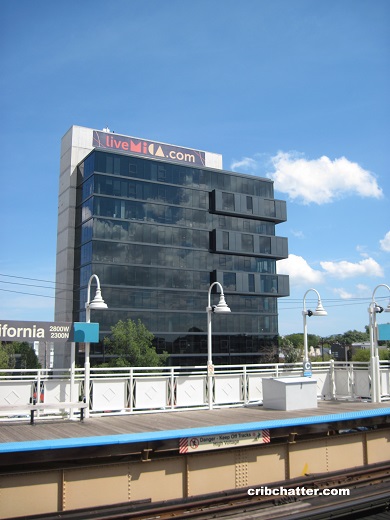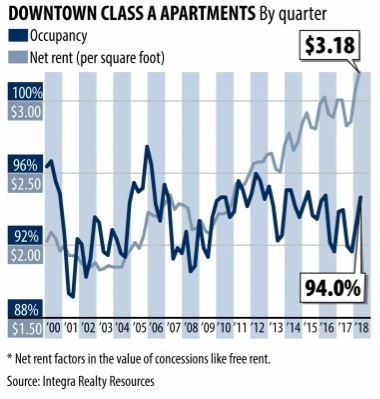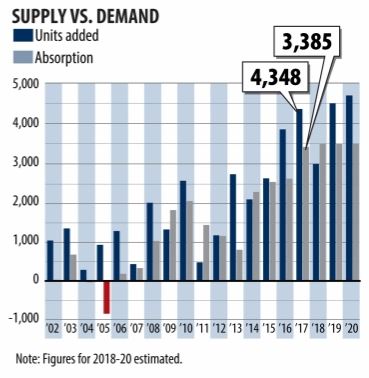Market Conditions: Does Chicago Have the Hottest Rental Market in the Country?
We’ve done a lot of chatter in the last few years about the sheer number of luxury apartments being built not only downtown but in the hot neighborhoods like Logan Square.
But according to recent data, the apartments are actually being absorbed even though they’re building record numbers.
That is in contrast to cities on both coasts, including New York, where there has been a marked slowdown in the apartment rental market with rents even falling in many cities.
From Crain’s:
Rents keep rising even though developers have binged, completing more than 13,000 apartments downtown over the past four years—more than the market needed.
But this year, demand has not only caught with supply but is exceeding it. A key measure of demand, absorption—or the change in the number of occupied apartments—totaled 2,995 units in downtown Chicago in the first half of the year, and Integra forecasts that absorption will total 3,500 units for the entire year, a record.
But Integra forecasts that developers will complete just 3,000 apartments downtown this year, down from a record 4,348 in 2017, when absorption totaled 3,385 units. It could be the first year since 2014 that demand exceeds supply.
“The scales have flipped a little bit this year,” DeVries said.
In the second quarter, Class A rents rose 5.7% year-over-year to a new record high of $3.18 a foot.
Class A occupancy was 94%, the same as last year despite the addition of all the new apartments.
But even more towers are still to come.
4500 more apartments are expected to be completed downtown in 2019 and another 4,700 in 2020.
The mega-tower just south of Grant Park, NEMA Chicago, is among them.
It will have 800 units and will be one of the tallest purely residential buildings in the world when complete, at 76 stories.
There were worries that all of these apartments wouldn’t be absorbed but they apparently are.
Who’s renting all these apartments?
Is Chicago the hottest big city in America right now?
Downtown apartment rents hit new high as boom continues [Crain’s Chicago Business, by Alby Gallum, September 4, 2018]



no clue who’s renting these in other areas but if the two new buildings in my neighborhood are any clue, its young, attractive people with a dog who are almost married or just had a baby, or young workaholics in IT or finance
People with high disposable incomes who aren’t necessarily ready to buy, but still want a nice rental.
For the longest time, Chicago had crappy rentals. If you wanted a nice place, you basically had to buy. There was a clear difference between a condo and an apartment. Now you can rent plenty of places nicer than many condos since there is a huge amount of inventory from the early 2000s that is now dated.
People are more cautious about buying if they aren’t settled in life yet. Owning a home can be a huge anchor around your neck in the short term. A ton of people got caught holding the bag thinking they could buy and move in two years when the bubble burst.
Most people I see buying nowadays typically have at least a five to seven year time horizon and typically settled (married or probably won’t be getting married in near future). They are also set in their jobs / careers and feel they have low odds of needing to relocate.
The other thing is that there is a huge influx of people moving here from more expensive cities. Chicago has always been somewhat underpriced imho compared to other Tier 1 and even Tier 2 cities. I think this is putting pressure on prices too.
This is a trend that just makes sense. if you’re in your late 20’s to mid 30’s with a good job, want to live in the city, don’t have kids or have very young kids, buying a property at best is not a significantly better financial decision than renting, and you lose the flexibility renting provides. This is because you are almost always going to either need to buy more property than you need now, or because you are going to have to buy less than you’ll need in X years, and you’ll eventually have to move before buying definitively becomes financially better than renting.
The previous generation got married younger, had kids younger and more often, and this wasn’t as big of an issue (property values were also more affordable for most given the smaller burden of debt most carried).
What I find interesting is that this trend in my opinion is a big part of why housing values in most suburbs, particularly the higher end, are so stagnant. There’s a decline in the amount of people that could otherwise afford to buy mid to lower-upper tier homes that are instead renting (or buying) in the city.
People have been acting like the apartment boom was some ridiculous bubble or that millennials were stupid in some way for renting, when in reality the behavior makes perfect sense as a response to the way the world is today.
I highly doubt Chicago has the hottest rental market in the nation. It is clearly blazing hot though. Vacancy is extremely low outside the general downtown neighborhoods.
tay = great insights (perhaps just because I agree). Millennials ARE influencing real estate (buy and rent) in ways that nobody seems to be covering – at least not accurately. Your point about the doldrums in the burbs is well evidenced. Who’s gonna buy the boomer’s houses in Winnetka and Hinsdale? GenXers? No way. Even if it is GenX, there’s not enough of them. So they sit – with prices falling back in line with the 90s.
I agree the rental market makes sense for the generation of people renting in Chicago right now. Of course not all renters are Millennials, but they represent a big chunk of the market. What I really wonder is what the real estate and rental market will look like in… say… 10-15 years when said Millennials DO have some coin and grounded-ness to start spending on a “roots” home. Then what?
“What I really wonder is what the real estate and rental market will look like in… say… 10-15 years when said Millennials DO have some coin and grounded-ness to start spending on a “roots” home. Then what?”
If the urbanization trend continues they’re either going to create/get caught in housing bubble or they’ll need to move to the burbs
Guessing that if the suburban market continues to stagnate, the bank of Mom & Dad wont be in a position to help with a down payment.
https://twitter.com/DanielKayHertz/status/1044987284318298114
thought this was an interesting tweet. Winnetka home sells at same price as it did in 1997. If this trend continues, Millenials are going to be happy to take these homes off their parent’s generation.
You guys don’t get it. We don’t want to live in the burbs. Period. You think that we’ll move out there after we have kids? Nope. Plenty of affordable places in the city to raise a family and good schools.
Is it more work to get your kid into a school in the city? Yes. But its doable these days. CPS is far, FAR better than it was 10+ years ago.
Just because older generations lived in the city for 2 years and then knocked up their wives only to move out to bumfuck suburbs doesn’t mean we are going to do the same.
Most of my friends plan on doing the same as well.
But you know don’t believe me, makes no difference. Keep swearing up and down I’ll change my mind.
“Millenials are going to be happy to take these homes off their parent’s generation.”
Youngest Millennials parents could be Gen X!
Older Millennials would have Baby Boomer parents though.
“Who’s gonna buy the boomer’s houses in Winnetka and Hinsdale? GenXers? No way. Even if it is GenX, there’s not enough of them.”
GenX has owned homes for 25 years. Lol. They already live in Winnetka and Hinsdale, if they want to. They’re at peak earnings and are now company CEOs.
You’re right ChicagoDog, they’re not going to buy the boomer homes for the reason you gave. That generation is too small. This has been an argument made for over 20 years by some economists and those studying the housing market. There have been warnings that there simply aren’t enough people to buy all the boomer houses from those who want to sell and move to, say, Florida. Ditto if they want to sell and downsize to a city condo.
And new preferences make that math even more difficult because buyers don’t want to live where Baby Boomers live (further out suburbs) nor do they want their types of homes (big).
Baby Boomers are screwed. We’re starting to see the evidence of it in all of these North Shore homes selling for peanuts 20 years later. The 90s, remember, were the “peak” Baby Boomers earnings years.
“What I really wonder is what the real estate and rental market will look like in… say… 10-15 years when said Millennials DO have some coin and grounded-ness to start spending on a “roots” home. Then what?”
Millennials range in age from 20 to 37. The older ones have already bought houses. But they’re also the ones who were most impacted by the financial crisis. Youngest ones in a completely different position.
“I highly doubt Chicago has the hottest rental market in the nation.”
Tone- who’s hotter? I’m asking in all seriousness.
Prices falling in NYC, including in Brooklyn. Prices now falling in the Bay Area. I don’t know about LA. They are building a TON of apartments in downtown LA. Not sure about absorption there. I haven’t heard much about DC lately either. Not sure that’s as hot as it was a few years ago though.
The argument that there are not enough millennials to purchase Boomer homes is not true.
“In 2016, the Pew Research Center found that millennials surpassed Baby Boomers to become the largest living generation in the United States. By analyzing 2015 U.S Census data they found there were 75.4 million millennials, based on Pew’s definition of the generation which ranges from 1981 to 1997, compared to 74.9 million Baby Boomers.[109][110]However with their revised end date of 1996, millennials are expected to surpass boomers in size in 2019.”
https://en.wikipedia.org/wiki/Millennials
Personal opinion — I don’t think boomers are screwed because there just aren’t enough Millenials to buy their homes, but they may be in for some pain because the younger generations in general take a more thoughtful approach to buying a home (and it’s a lot easier with all the information available today). It’s also to a large extent the policies the Boomers created that caused today’s young adults to need to incur significant debt to even enter most parts of the workforce. Young people’s hands are to some extent forced into making more responsible decisions.
“The argument that there are not enough millennials to purchase Boomer homes is not true.”
Who argued this?
There aren’t enough GenX buyers. They are a much smaller generation. Millennials are larger but they don’t want to live where Boomers live. Hence, Boomers are screwed and it’s already happening in all the suburbs as the 60+ year old Boomers try and downsize or sell to retire to Florida/Arizona. No one wants their houses on the North Shore, Barrington, Geneva, St. Charles, Burr Ridge, Flossmoor and other suburbs.
Lots of economists have predicted this problem for the Boomers as long ago as 20 years ago.
My mistake, I thought that was what you meant.
I still think eventually the millenials will move en masse to the suburbs, they just aren’t old enough and / or the prices aren’t low enough (or attractive enough on a relative basis).
Eventually if the north shore etc. stagnates enough, it will be attractive enough compared to the other options. I don’t think it’s that millenials won’t live in the suburbs, it’s that they place more of a premium on city / some urban living, and they are more value conscious (not price, value of everything that goes with the home) when buying homes.
@a
“You think that we’ll move out there after we have kids? Nope. Plenty of affordable places in the city to raise a family and good schools.”
hah! unless you’re an extremely high earner, raising a family in the city is extremely difficult. Good luck!
“hah! unless you’re an extremely high earner, raising a family in the city is extremely difficult. Good luck!”
———————
Not to mention the gangs trying to recruit your kids. Sure, suburbs have gangs, but nothing like Chicago does.
Gangs trying to recruit your kids????
Lol, do you only know people in Englewood?
Even if you do move to a neighborhood with a good elementary school, you still don’t know where your kid will go to high school.